On April 12-13, 2025, the 2nd Language Cognition and Development Roundtable Forum, hosted by School of International Studies, Zhejiang University and organized by the Language Cognition and Development Laboratory of School of International Studies, was held at Zijingang Campus, Zhejiang University.
The forum featured keynote speeches by Prof. Brian MacWhinney from Carnegie Mellon University and Prof. LI Ping from the Hong Kong Polytechnic University, alongside 12 invited speeches by leading scholars from institutions including Beijing Normal University, Beijing Language and Culture University, University of Electronic Science and Technology of China, Fujian Normal University, Chinese Academy of Sciences, South China Normal University, the Hong Kong Polytechnic University, Shanghai Jiao Tong University, Tongji University, Tianjin Normal University, and Renmin University of China. Over 110 participants from domestic and international universities were present.
Prof. DONG Yanping, Dean of the School of International Studies and Director of the Language Cognition and Development Laboratory of the School of International Studies, delivered a welcome speech at the opening ceremony and also moderated the keynote session.
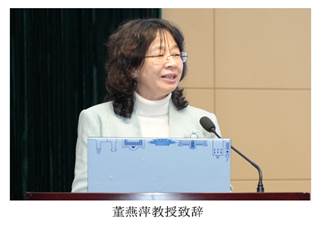
Prof. DONG Yanping
During the keynote presentation, Prof. Brian MacWhinney delivered a speech titled “From the Competition Model to Emergentism,” elucidating the Emergentist framework rooted in the classic Competition Model. He explored theoretical expansions through project-based learning, perspective tracking, mental model construction, neural emergent mechanisms, universal grammar (UG), statistical learning, and large language models (LLMs). Prof. LI Ping’s keynote speech, “Generative AI’s Impact on Language and Cognition: What’s Left for Us to Study?”, argued that researchers should integrate cutting-edge technologies (e.g., neurocomputational theories, developmental cognitive modeling) and high-quality data to investigate language learning, processing, and representation mechanisms. He highlighted opportunities to leverage generative AI for evidence-based, personalized language pedagogy, driving bidirectional innovation in theory and practice.
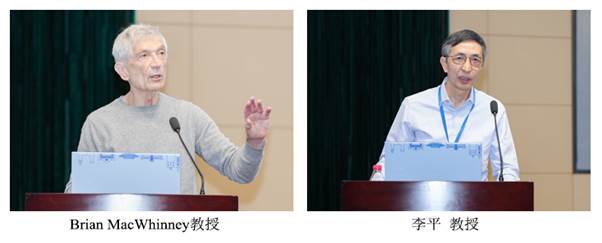
Prof. Brian MacWhinney Prof. LI Ping
During the forum, 12 presentations in three sessions, moderated respectively by Prof. ZHOU Peng of Zhejiang University, Prof. WANG Ruiming of South China Normal University, and Prof. Yang Jing of Zhejiang University, delivered insightful studies covering cross-disciplinary technologies to explore different topics of language cognitive processing and different age groups, guiding the participants to understand the cutting-edge frontier studies in language cognitive processing and its lifelong development research from a full life cycle and dynamic interdisciplinary perspective.

Prof. ZHOU Peng Prof. WANG Ruiming Prof. YANG Jing
Several experts delved into the mechanisms and developmental trajectories of language processing through the lens of bilingual cognitive processing. Prof. CHEN Baoguo from Beijing Normal University presented findings on language-switching paradigms under varying emotional states, proposing a theoretical model of how emotional states influence bilingual adaptive control. Prof. DONG Yanping of Zhejiang University integrated empirical evidence on how interpreting experience modulates interpreters’ cognitive control capacities, analyzing how attentional control systems regulate language tasks in response to cognitive load fluctuations in an adaptive way. Prof GAO Shan from the University of Electronic Science and Technology of China introduced masked translation priming paradigms to demonstrate how emotional regulation systems shape language processing dynamics. Prof. WANG Ruiming of South China Normal University investigated bilingual language control mechanisms through written production studies, while Prof. YU Miao of Tianjin Normal University examined incidental vocabulary learning in L2 Chinese learners using offline assessments and eye-tracking technology, offering targeted pedagogical recommendations based on experimental outcomes.
Focusing on lifespan development in language cognition, the presentations also addressed age-specific processing characteristics in children and older adults. Professor JIANG Xin from Beijing Language and Culture University compared transposed-character effects in reading between children and adults, providing empirical validation for the multiple-route model of visual word recognition. Prof. YANG Xiaohu of Shanghai Tongji University explored aging-related declines in prosodic perception, revealing neural mechanisms underlying speech processing deterioration in older adults. Prof. ZHANG Qingfang from Renmin University of China highlighted age-related differences in emotional word processing, with findings supporting the socio-emotional selectivity theory that older adults prioritize positive emotional stimuli to optimize affective goals.
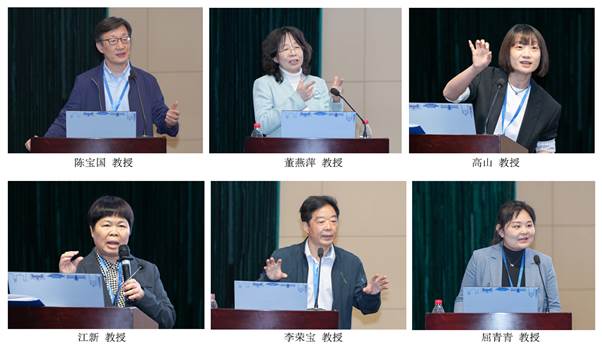
Prof. CHEN Baoguo, Prof. DONG Yanping, Prof. GAO Shan,
Prof. JIANG Xin, Prof. LI Rongbao, Prof. QU Qingqing
The experts further probed the deep mechanisms of language cognition through the lens of Chinese-specific linguistic systems. Prof. QU Qingqing from the Chinese Academy of Sciences investigated the relationship between language and cognition using Mandarin’s unique classifier system, with behavioral experiments in her presentation providing cross-linguistic empirical evidence for linguistic relativity. Prof. WU Fuyun of Shanghai Jiao Tong University analyzed real-time neural processing of internal word-order errors in reversible sentences through integrated eye-tracking and electroencephalography (EEG) paradigms, revealing how the brain resolves syntactic ambiguities unique to the Chinese language.
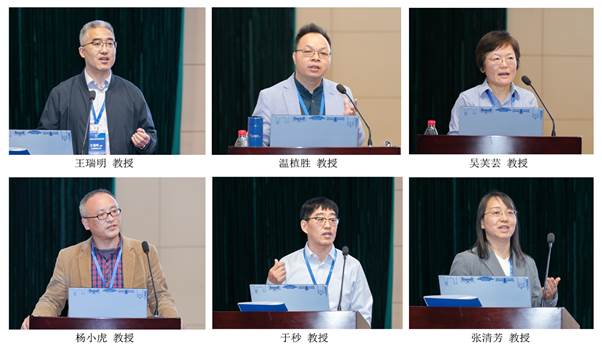
Prof. YANG Ruiming, Prof. WEN Zhisheng, Prof. WU Fuyun,
Prof. YANG Xiaohu, Prof. YU Miao, Prof. ZHANG Qingfang
Expanding into interdisciplinary and cross-cultural perspectives, scholars explored broader sociocultural dimensions of language and cognition. Prof. LI Rongbao from Fujian Normal University applied complex systems theory to psycholinguistics, examining phenomena such as linguistic violence, translation competence development, and age-related language attrition. Prof. WEN Zhisheng of the Hong Kong Polytechnic University proposed the “translingual self” hypothesis, theorizing how multilingual individuals construct and express identity through neuro-cognitive, embodied, and technological interactions across linguistic, cognitive, and digital spaces.
The parallel sessions, held at Linshui Auditorium and East 1 Building, featured nine thematic discussions: (1) language processing and development in children/older adults; (2) interpreting mechanisms; (3) L2 vocabulary acquisition; (4) embodied perception and emotional word processing; (5) L2 pedagogy and production; (6) phonetic processing and music-language interactions; (7) bilingual lexical, syntactic, and discourse processing; (8) technology-enhanced interdisciplinary language cognition; and (9) cross-cultural cognitive-linguistic studies. Presenters shared cutting-edge findings, sparking dynamic exchanges that bridged theoretical frameworks and methodological innovations.
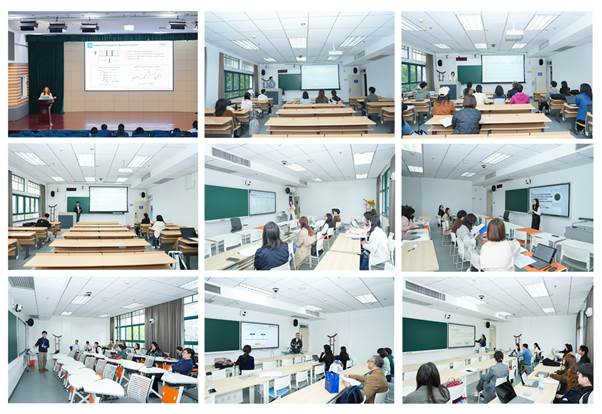
The poster presentation session showcased cutting-edge research findings through meticulously designed posters, featuring a diverse array of studies in bilingual processing, L2 acquisition, language and sociocultural cognition, and computational approaches to language cognition. Employing multifaceted methodologies—including neuroscientific techniques, behavioral experiments, normative modeling, quantitative analysis, and case studies—the posters exemplified methodological innovation and interdisciplinary rigor. Participants engaged in face-to-face exchanges at the display boards, sharing theoretical frameworks, experimental designs, and practical insights. This session not only highlighted emerging trends in cognitive linguistics but also fostered collaborative networks across institutions. Following the poster presentations, the Second Language Cognition and Development Roundtable Forum concluded successfully, marking the culmination of a two-day intellectual exchange that bridged theoretical exploration and applied research in language sciences.
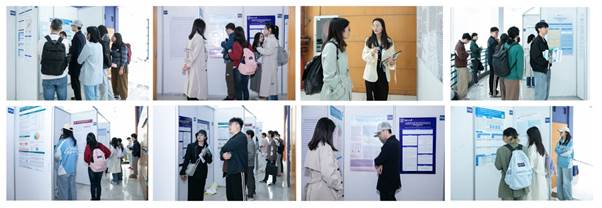
Language Cognition and Development Laboratory of the School of International Studies
Translated by SUN Fangrui, Proofread by XU Xueying



